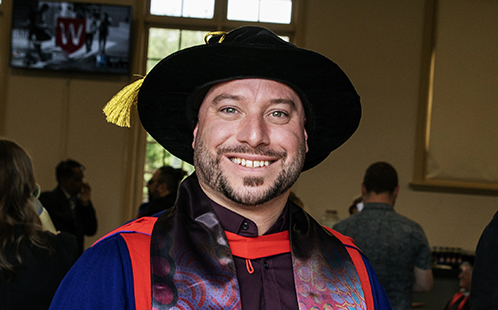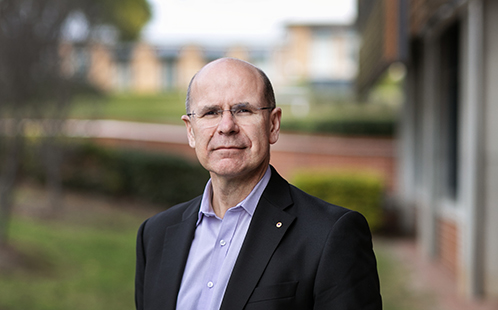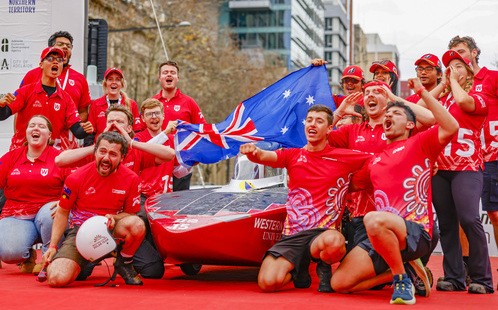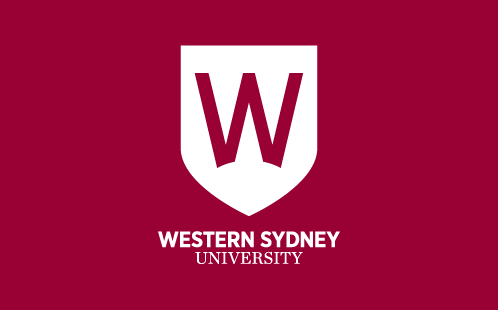Dr Paul Saunders graduates with PhD, championing Indigenous health and education

Dr Paul Saunders, a proud Biripi man, has graduated with a PhD from Western Sydney University, marking the culmination of years of research and dedication to improving Indigenous health and medical education.
He crossed the stage at a graduation ceremony at the University’s Parramatta South campus on Monday, 27 October.
Dr Saunders’ research interests focus on the structural and social determinants of Indigenous health, medical education, and care coordination pathways that support culturally safe models of care for Indigenous communities. His thesis, ‘Striving for Aboriginal intercultural development through medical education: A mixed-methods inquiry to understand student transformation’, explored the student experience regarding Aboriginal intercultural development within medical education.
Beyond the focus of his doctoral studies, Dr Saunders also expressed the need for building the Indigenous health workforce, stating, “Aboriginal and Torres Strait Islander Peoples are underrepresented not only in healthcare, but also within the health academy”.
“I saw my PhD as a way to change how Aboriginal and Torres Strait Islander Health is perceived in medical education and to highlight the strength our communities bring to the healthcare space.”
Dr Saunders said his motivation for undertaking a PhD was to enhance his capacity within the academic space and to be a voice for community within medical education. He benefited from the Yarramundi Postgraduate Research Scholarship, allowing him to undertake his PhD journey full-time while also being engaged in the University’s School of Medicine.
An Associate Professor and Academic Lead, Indigenous Health within the Graduate School of Medicine at the University of Wollongong, he has experience in clinical medicine, medical devices, and Indigenous Health education and research, including research project management.
“My findings from my PhD really inform my work at Wollongong, particularly in ensuring community governance and centring community voices in curriculum design.”
“We’re critically analysing how Indigenous Health curriculum can be scaffolded and integrated across the medical program and how each element can influence other components within the program.”
He highlighted a renewed focus on Indigenous Health and cultural safety in medical education as an opportunity for real change, despite challenges.
“Two-way learning between Indigenous and non-Indigenous Peoples within medical education is vitally important - not only to embed Indigenous voices in a genuine way, but to show how Indigenous knowledges can enhance medical education itself.”
“We’re in a transition period at the moment. It provides a really good opportunity to understand the impacts we can have down the line, one of them is graduating more Indigenous doctors. Another is educating and upskilling the non-Indigenous medical workforce that are going through medical school as well, with a view to have healthcare systems that are culturally safe.”
For Indigenous early career researchers, including those in medicine, he said his most important advice is to stay grounded and supported.
“Always, always, look after yourself. It’s not an easy environment to be in. Surround yourself with supportive people, which is also important. Seek guidance when you need it. We don’t have to feel like we have to do everything by ourselves. Be guided by the community, your Elders, and those who have been on the journey before.”
“The more people you connect with within your network, whether that’s community, your family, or other Indigenous Health colleagues, it’s important to establish and nurture that network because that is the network you need moving forward to ensure your well-being and to ensure that collective voice is both strong and heard.”
ENDS
6 November 2025
Photo credit: Sally Tsoutas
Latest News

ABC RN transcript: Vice-Chancellor Professor George Williams discusses higher education sector, student support, and the impact of AI
The following is a transcript of an interview that aired on ABC Radio National Saturday Extra between presenter, Nick Bryant and Vice-Chancellor, Distinguished Professor George Williams AO.

Western Sydney University are the number one Australian solar car team at the 2025 Bridgestone World Solar Challenge
Western Sydney Solar Car team has crossed the finish line placing preliminarily sixth in the world overall, and the number one Australian team in the world’s most prestigious solar car challenge.

Western Sydney University Statement on Cyber Incidents
Western Sydney University has issued an update to its community following confirmation that previously stolen personal information was published online, including on the dark web.
Mobile options:

